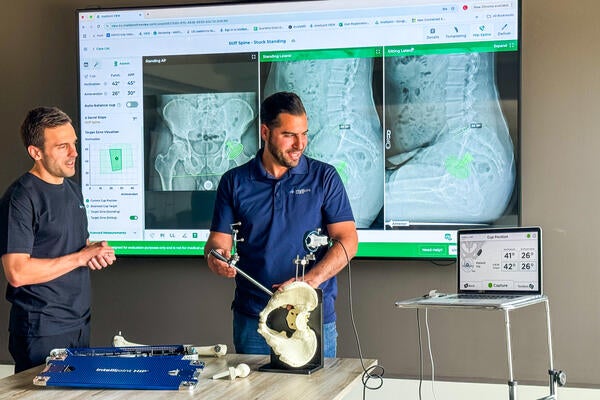
FleetCarma: keeping close tabs on electric vehicles
Do you want to help facilitate the upcoming global transition to electric cars, but remain in Waterloo? If so, Matt Stevens (BASc '04, Chemical; PhD '09, Chemical) is the person to talk to

Do you want to help facilitate the upcoming global transition to electric cars, but remain in Waterloo? If so, Matt Stevens (BASc '04, Chemical; PhD '09, Chemical) is the person to talk to
By Chuck Black Faculty of EngineeringDo you want to help facilitate the upcoming global transition to electric cars, but remain in Waterloo? If so, Matt Stevens (BASc 2004, Chemical; PhD 2009, Chemical) is someone to talk to.
After obtaining a bachelor’s degree and his PhD from Waterloo Engineering, Stevens is currently the CEO of FleetCarma, a Waterloo-based firm that builds “the number one connected car platform for electric vehicles.”
His company has developed an on-board device that attaches to electric vehicles to track battery usage, charging data and other performance metrics needed to operate a fleet of plug-in vehicles – the only system in the world with its capabilities.
Once a number of electric vehicles are being charged at one building or within one utility services area, the FleetCarma system can also manage the overall charging load – ensuring vehicles are fully charged when needed and providing a flexible load to the building and power grid.
In addition to electric vehicles, the devices can be installed in existing gas and diesel vehicles, with usage data from all vehicles used to create an electric vehicle suitability assessment. The result is an action plan identifying where electric vehicles have enough range and where they can be used to save money. Fleets across North America and in Europe have been using the system for the last five years to smartly integrate electric vehicles.
Stevens believes these personalized buying tools will help accelerate adoption, and that educational and deployment systems will contribute to the growing consensus that electric vehicles are the future of the automobile industry.
Others seem to agree. His firm’s clients include BC Transit, Florida Power and Light (FPL), New Brunswick Power, the Oak Ridge National Laboratories and a variety of leasing companies. The company is also working with major electric vehicle manufacturers to drive adoption of the technology.
Stevens credits the lessons he learned at Waterloo for contributing to his success. As a student, he was captain of the student-run University of Waterloo Alternative Fuels Team (UWAFT) from 2004 to 2006. His team put a working fuel-cell hybrid powertrain into a Chevrolet Equinox.
“When you get to university, join a team working on something you love,” he says. “If you can’t find a team on campus doing something you love, then build it yourself. Your professors will support you. Mine did.”
As for his company, Stevens says it’s the “dominant player in a tiny market.”
The markets are growing, however, and the next few years could be critical.
“The regulations governing the industry are now being put into place,” Stevens says. “If those regulations are supported by the proper collection of useful data, it could very quickly bring us to a tipping point where electrical becomes a more cost-effective solution than traditional gasoline-powered engines.”

Read more
Two University of Waterloo–affiliated health-tech companies secure major provincial investment to bring lifesaving innovations to market

Read more
How Doug Kavanagh’s software engineering degree laid the foundation for a thriving career in patient care

Read more
Upside Robotics secures new funding to accelerate the future of sustainable farming
The University of Waterloo acknowledges that much of our work takes place on the traditional territory of the Neutral, Anishinaabeg, and Haudenosaunee peoples. Our main campus is situated on the Haldimand Tract, the land granted to the Six Nations that includes six miles on each side of the Grand River. Our active work toward reconciliation takes place across our campuses through research, learning, teaching, and community building, and is co-ordinated within the Office of Indigenous Relations.